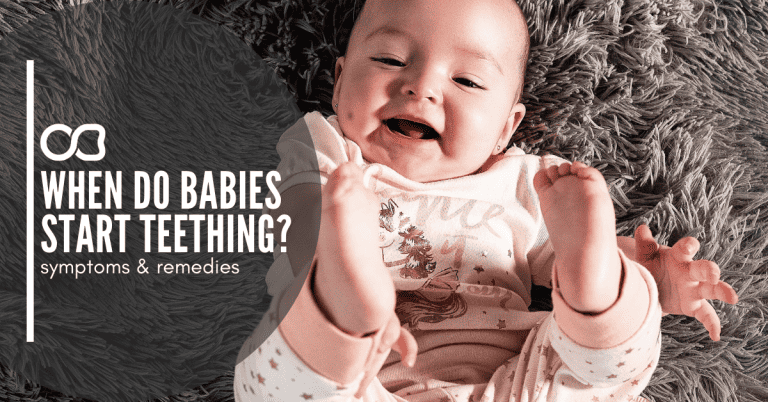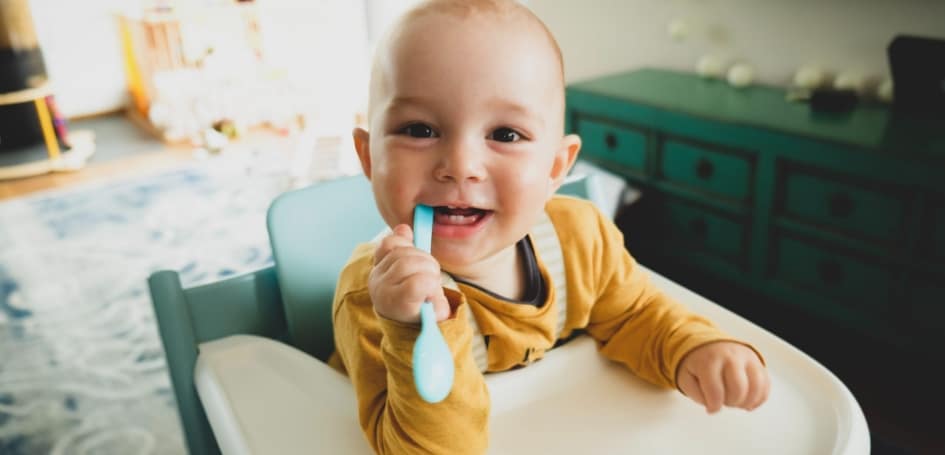Not only is teething an uncomfortable time for your baby, but it can also be stressful for yourself as a parent when you may not know exactly what your child is going through.
The teething process is different for all children, but the more general information you have about these milestones, the better prepared you will be to help your baby feel more comfortable and achieve a healthy smile from an early age! Here are some commonly asked questions about teething symptoms and remedies to reduce pain and discomfort.
Article Summary
- What age does teething begin?
- How long does teething take?
- Does teething hurt?
- Is my baby teething?
- Does teething get worse at night?
- How can I reduce teething pain?
- Can I breastfeed during teething?
- Which order do baby teeth come through?
- Do babies eat less when they’re teething?
- Do babies poop more when they’re teething?
- When should I start brushing my child’s teeth?
- When should my child first visit the dentist?

1. What age does teething begin?
A baby’s first tooth can erupt anywhere from approximately three to twelve months, with the average age being approximately six months. Babies who are born prematurely often have their first teeth coming through at a later time, and each child is different. This means that even if a younger baby has more teeth than one who is a few months older, this is nothing to worry about as each child’s experience will vary.
2. How long does teething take?
Each tooth will normally only create discomfort for several days in most cases but can take more time for some children. This can be up to eight days total, including four days prior to the tooth pushing through the gum and three days following. The entire teething process usually finishes at around two to three years old.
3. Does teething hurt?
Teething isn’t always necessarily painful, but younger babies may seem to be in more pain as they aren’t as accustomed to coping with discomfort as older babies.
4. Is my baby teething?
For many children, the most common symptoms of teething include:
- Irritability or change in mood
- Increased drooling
- More frequent biting, chewing or sucking
- Red, inflamed gums
- Red chin or cheeks
- Refusal of food
- Difficulty sleeping
- Rubbing the face or grabbing the ears
When the teeth are coming through, you may also notice a blue-ish coloured bubble on your baby’s gums, called an ‘eruption cyst’. This is nothing to be concerned about, and it will normally go away by itself. A combination of these symptoms often points to teething as the cause, but this may not always be the case, so if you’re uncertain it’s best to make an appointment with your doctor.
5. Does teething get worse at night?
Teething may appear to cause more pain and discomfort at night while there are less distractions when your baby is trying to sleep. It can also cause some children to wake up a few times during the night.
6. How can I reduce teething pain?
There are a variety of items and home remedies that you can use to help reduce and relieve the symptoms of teething above to make your baby feel more comfortable.
These include:
- Teething toys: You can give your baby toys specifically made to be safe for chewing on, as the plush or soft rubber can provide relief to the gums.
- Gum massage: Using clean fingers, you can gently rub the painful spots on the gums, as the counter-pressure can soothe the discomfort.
- Cold cloth: Place a clean, damp washcloth in the fridge or freezer before giving it to your baby to chew on. The cold sensation can reduce pressure and swelling of the gums.
- Medication: If these products and methods aren’t providing relief, you can ask your doctor, dentist or chemist for advice on pain relief medicine that will be most suitable for your baby.
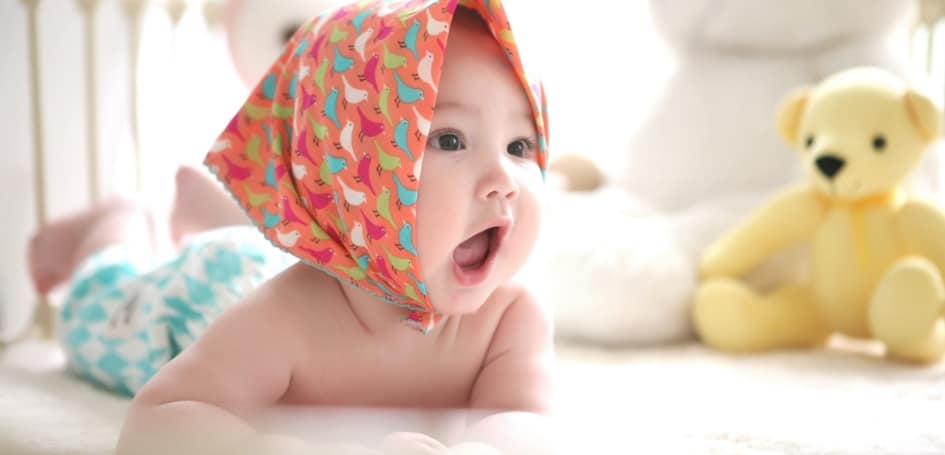
7. Can I breastfeed during teething?
Your baby’s preference for breastfeeding while teething may differ from another child’s, as some may find it comforting while others may feel that the sucking motion increases the pain. To help prevent your baby from biting, you can gently rub their gums with a clean finger to reduce discomfort, and if they bite, pull them away quickly and say “ow!” to help them understand not to repeat the behaviour again.
8. Which order do baby teeth come through?
Teeth normally appear in pairs and follow a general process in alignment with the baby’s age, though this is not always the case as every child is different. The two bottom middle teeth (central incisors) usually erupt first at approximately six months, and then the upper middle teeth a few months later. The surrounding teeth (upper and lower lateral incisors) come in around two months after the previous.
The first back molars usually erupt at 12 – 14 months, and can cause the most discomfort as they are the largest teeth we have. The four canine teeth then appear at 18 months, followed by the second molars at two years.
9. Do babies eat less when they’re teething?
The desire to eat will differ between children when teething. Some may experience more discomfort eating with inflamed gums, while other babies may wish to eat more frequently to create a counter-pressure on the gums by chewing. If your baby refuses to eat or nurse for several days, you should visit your doctor or paediatrician for advice.
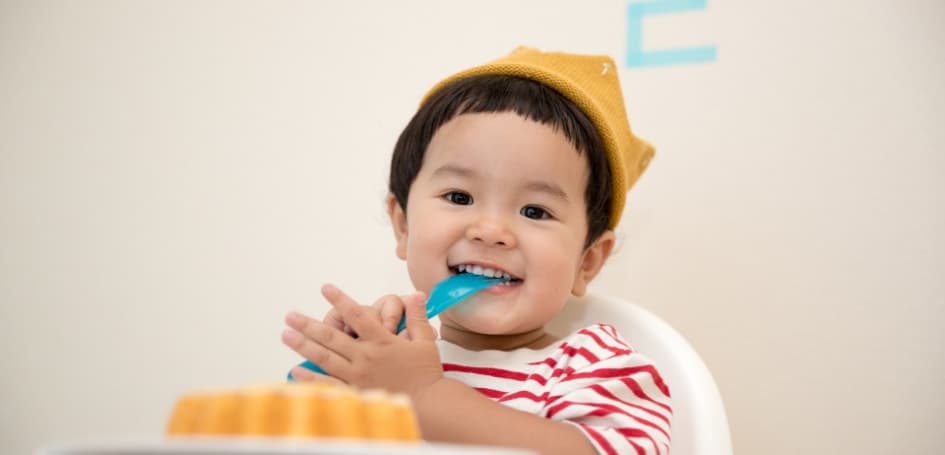
10. Do babies poop more when they’re teething?
Teething does not directly cause an increase in the bowel movements of your baby, although this is a common belief. This is due to the fact that parents often start to feed their child solid foods at six months old, which is also around the time that teething begins. In this case, it’s the actual food that is causing the child to poop more. If your baby is suffering from diarrhoea for more than 24 hours, ensure they drink a sufficient amount of fluids and visit your paediatrician or doctor for further guidance.
11. When should I start brushing my child’s teeth?
You’ll need to start practicing a good oral hygiene routine with your child right from when their first tooth erupts! Dental decay can affect teeth of any age, but can be prevented with thorough cleaning. You can simply clean your baby’s teeth by gently brushing or rubbing their teeth with water. You shouldn’t use toothpaste until your child is around three years old, as younger babies are more inclined to swallow it. At this age, they can begin to use a very small amount of children’s fluoride toothpaste (less than a pea-amount) twice daily.
12. When should my child first visit the dentist?
You should bring your baby to the dentist for their first dental check-up at around two years old, where we will examine their teeth and jaw to ensure they’re growing as they should be and to spot any issues early. Your dentist is also the best person to show you how to correctly brush your child’s teeth and offer advice on the best diet to keep their teeth in the greatest condition as they grow!
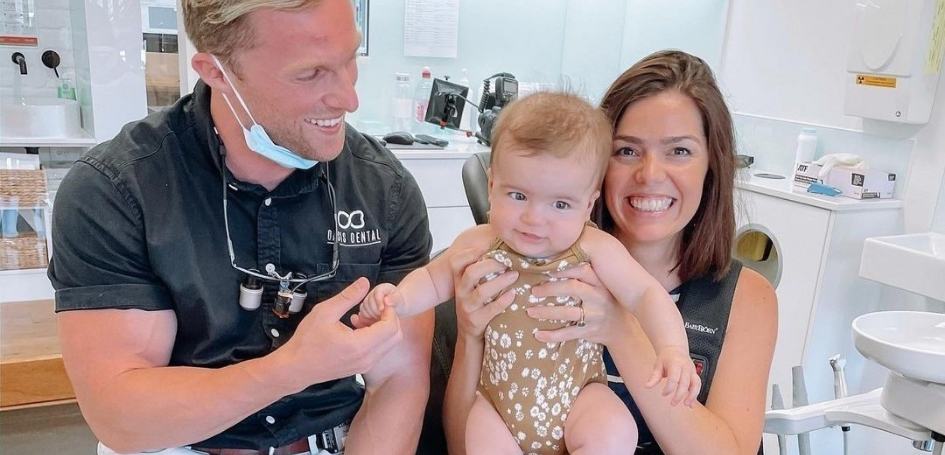
Children’s Dentist On The Gold Coast
Oasis Dental Studio offers a dental team who are highly experienced when it comes to your child’s oral health. We create a pleasant and fun environment to ensure your child is comfortable at every visit.
If you’re looking for a kids’ dentist on the Gold Coast, get in touch for more information on our children’s dental services today.
